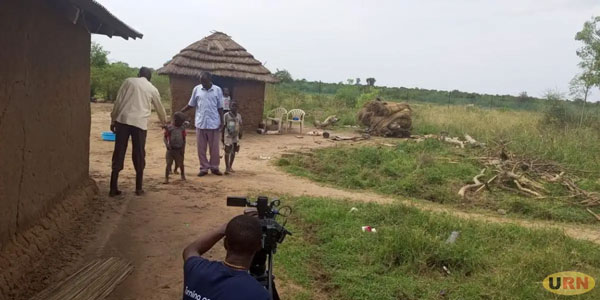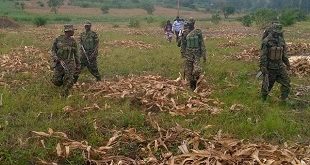
Buliisa, Uganda | THE INDEPENDENT | Fred Balikenda, of Kirama Village, Kigwera Sub-county in Buliisa District is determined to die for his land unless the government and TotalEnergies pay him Sh200 million for his house and his pigs that reportedly starved to death.
Balikenda is one of the nine Project Affected Persons (PAPs) under the second Resettlement Action Plan (RAP2) that are yet to receive full compensation or resettlement for their land that has been acquired for oil and gas activities.
But Balikenda’s case sounds quite different from the others because he lives on family land while the other of his relatives on the same piece were resettled after TotalEnergies compensated for the land totalling 16 acres. The land in question is part of the land that the firm is acquiring for six well pads, roads, truck lines and a water abstraction station, among others.
The land in the area was being compensated at 3.5 million Shillings per acre, which residents, especially those that are holding out, say is very little because, in neighbouring villages, an acre goes for as high as 10 million Shillings.
According to TotalEnergies, Balikenda received his cash compensation in May 2022 “for the value of his assets (structures, crops and trees) along with a 30 per cent disturbance allowance and a 30 per cent uplift pay.”At first, Balikenda said he would move if the house that TotalEnergies is constructing for him is complete.
But now he says the company has fenced off his land illegally leading to great inconvenience and loss of a livelihood, hence his push for a 200 million shillings “compensation”.
TotalEnergies says Balikenda’s house has been given priority so that it is handed over to him early this year. The company says that the process took longer because the beneficiary took longer to decide where he wanted to be relocated. All PAPs are given chance to choose their preferred sites.
“Unfortunately, Balikenda delayed the selection of his resettlement site until July 2022. Prompt action was undertaken thereafter by TotalEnergies EP Uganda to expedite the purchase of his selected land, and this was completed in August,” said TotalEnergies EP Uganda Corporate Communications Manager, Anita Kayongo in a statement.
But as the construction of the new house, a few hundred meters away, progresses Mota-Engil, the company contracted by Total to construct the well-pads, fenced off Balikenda’s land, to within about 100 meters of his iron-roofed mud-and-wattle house.
This comes after talks with Total to relocate him and his family temporarily failed. Balikenda confirms TotalEnergies’ statement that he had wanted to be temporarily relocated to Hoima in a place rented by the company, instead of Buliisa where the others were rented for.
TotalEnergies says that according to their policy and the national and international resettlement good practices temporary relocation of PAPs should be within 10 kilometres of their current residence notably “to ensure that the social networks of the household are maintained.”
This is the reason why they disagreed with his insistence that he should be taken to Hoima, about 100 kilometres away. However, the company says his temporary accommodation is ready.
In September last year, Mota Engil fenced off most of the land and Balikenda says he has since faced a lot of inconveniences, including having nowhere to feed his pigs and chicken. According to him, most of his pigs have died as a result and he says he wants compensation for them too.
However, TotalEnergies says the fencing off was not aimed at either suffocating him or taking away his land but to protect his family and animals from straying into dangerous areas where they could be harmed by the industry activities.
“For the family’s safety, a perimeter fence has been erected around the neighbouring construction works, following consultations and approval by Mr Balikenda. He continues to have access to his full property including the garden and grazing area and we are making every effort to ensure that Mr Balikenda and his family are not inconvenienced during this temporary period,” Kayongo says.
Balikenda says that he has never signed a temporary relocation document because he does agree with the terms of the company, and he feared that they could later use the document against him if he changed his mind.
The Petroleum Authority of Uganda says they are satisfied with the progress of compensation so far, adding that in the Tilenga (TotalEnergies’ area of operation), more than 98 per cent of the PAPs have been settled, by agreement.
“For the well-pads, there is about two per cent or eight to nine people who are still holding out. But if you have nine people out of 7,000, that is good performance, in my view,” says Ali Ssekatawa, the Legal and Corporate Head at PAU.
He says there were some delays in compensation especially due to the disruptions of the Covid-19 pandemic, but also that some persons change their minds later when a decision has already been made. He gives an example of road construction, that when they fail to agree with a PAP, they usually have the alternative of diverting the road’s way.
“But then when some people realise that we are diverting they come back running asking to be included in the RAP,” Sekatawa says. On other causes of delays like negotiations and Covid 19, Ssekatawa says there is a 30 per cent disturbance fee paid on top of the cost of the property, and another 15 per cent per year to cater for the delay period.
*****
URN
 The Independent Uganda: You get the Truth we Pay the Price
The Independent Uganda: You get the Truth we Pay the Price


